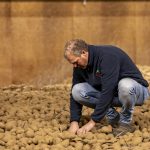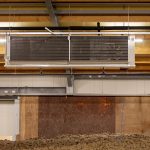In the middle of the storage season, Equans came by to take a close look. Do the potatoes in the two types of storage differ in terms of quality after four months of storage?

How can we store our potatoes for as long as possible without compromising on quality? The mechanical storage solution from Equans provides an answer to the question of the Geraats brothers. In this case, it no longer matters whether it is too hot or too humid outside. Because now the potatoes are stored in an almost completely closed space. Thanks to the stable temperature, air humidity, and CO2 value, the potato stays practically fresh until the summer.
Keeping the products good for a long time used to be quite a challenge for the Geraats brothers. Firstly because of the sandy soil in the village Baexem in the Limburg province. “In clay ground, potatoes get a thicker skin and a firmer structure. That keeps them calm during the storage period. However, potatoes out of sandy soil are more willingly to sprout during the storage period”, Bert Geraats explains. Secondly, the current climate, characteristic for its fluctuating temperatures, lead to too much moisture loss and CO2 production in the potato. This has a major impact on baking quality.
The storage method of the Geraats brothers also has its challenges. “Potatoes that are stored separately require more attention than potatoes that are stored in crates. Our potatoes are stacked on top of each other. When extracting moisture, the potato shrinks and that leads to rot pockets. A damaged product will rot and infects surrounding potatoes. When one rot pocket is created in the five-meter-high stack, then everything has to be removed, leading to massive product losses.”

Equans has put an end to these problems with mechanical cooling. Geraats: “7 degrees remains 7 degrees. If the CO2 content exceeds 4,000, ppm, the system will extract this to the outside air. Due to the optimal conditions with Equans’s storage technology, the potato has an optimal moisture balance. The potato does not become soft and there is no bruising. That way, no rot pockets occur.”
An additional advantage of the closed system is that the biological sprout inhibiting agent evaporates less quickly. As a result, we need less of it than in storage cooled with the outside air”, Geraats says.

Geraats Potatoes takes samples of the potatoes in both types of storage every two weeks. The conclusion after the last test? Very positive. “Where the moisture loss of the potatoes in the storage cooled with the outside air is around 10% for the entire season, that of the potatoes in mechanical cooling is now between 1.2 and 1.5%. That way we have what we hoped for”, Geraats says enthusiastically.
With a maximum of 3% dehydration at the end of the storage season, Equans’s expectations are even more hopeful than that. Although the potatoes will remain in storage for a few more months, more dehydration is not expected to occur. A big plus for both brothers.

“The fewer the moisture loss, the lesser the potato shrinks and loses quality and weight. With regards to the number of kilos we produce, this leads to a considerably higher yield. We will not underestimate that. It looks like we can keep our potatoes well without sprouting until July, but it remains a challenge. Our customers in the French fries industry are then assured of good potatoes that bake crispy and well all year round.”

